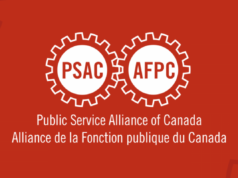This week, the National President of the Customs and Immigration Union, Mark Weber, addressed the House of Commons Standing Committee on Citizenship and Immigration as well as the Standing Committee on Public Safety and National Security as part of the Committees’ studies Bill C-12, the Strengthening Canada’s Immigration System and Borders Act.
Acknowledging some of the positive aspects of C-12 — such as language in the Customs Act that would see commercial operators need to provide border officers with access to facilities for both import and export inspections — Mark Weber impressed on both committees how the bill reinforced the need for adequate staffing to ensure a well-functioning border along with a secure, fair immigration process.
“While Bill C-12 seeks to speed up the refugee claim process to address ‘lengthy processing times and backlogs’,” said Weber, “it is worth pointing out that without the sustained understaffing our border system has experienced for years, these lengthy processing times and backlogs, and therefore the pressure to seek efficiencies, would likely be far less considerable.”
“Efficiencies,” continued the National President, “as implemented by CBSA management, almost always result in a degradation of the security and integrity of our border processes. We’ve seen it with traveller operations, where people seeking entry into Canada do so through an automated machine, with no real interaction with officers. And, outside of Bill C-12, we’re already seeing it in some circumstances with the refugee claim process itself, where the Agency’s simplified intake process — known as ‘One Touch’ — means claimants spend significantly less time meaningfully interacting with officers, with the result of reduced security for the sake of expediency.”
Interactions between officers and anyone who seeks to enter the country is a key component of border security. These interactions allow officers to recognize patterns that can otherwise be missed, ensuring that any potential problem is detected early on and will not put further stress on the system at a later date.
Experienced officers have the training necessary to navigate complex processes efficiently without compromising security. Yet, too often, CBSA prefers to push out experienced officers — as it is currently in the process of doing with nearly 200 officers who cannot carry a firearm — eroding both its institutional memory and its ability to maintain a direct contact with people transiting through our borders.
“Ensuring the security and integrity of our border and associated processes starts with an adequate human presence” concluded Weber. “Without this, without the human element, no bill can hope to truly solve border issues on the long term.”
Full recording of the proceedings (with interpretation language options):





